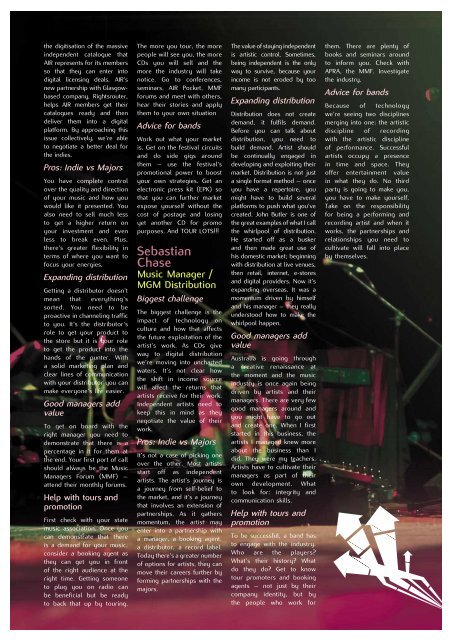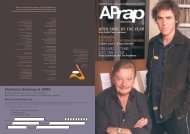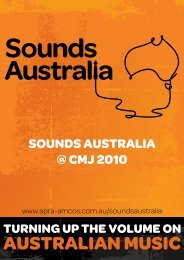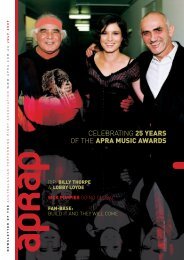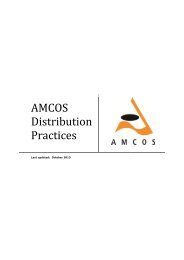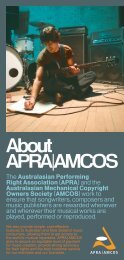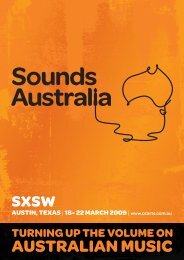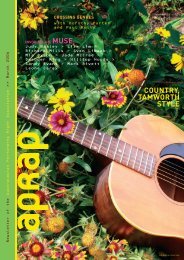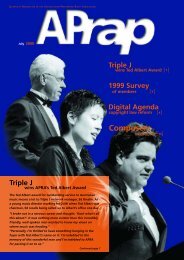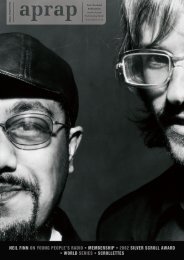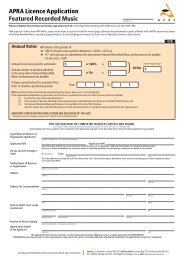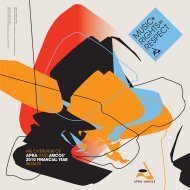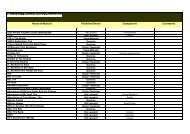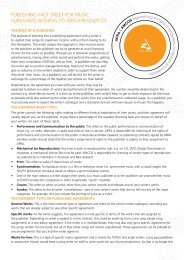Never stop dreaming, never stop learning, laughter is a cure ... - APRA
Never stop dreaming, never stop learning, laughter is a cure ... - APRA
Never stop dreaming, never stop learning, laughter is a cure ... - APRA
Create successful ePaper yourself
Turn your PDF publications into a flip-book with our unique Google optimized e-Paper software.
the digit<strong>is</strong>ation of the massive<br />
independent catalogue that<br />
AIR represents for its members<br />
so that they can enter into<br />
digital licensing deals. AIR’s<br />
new partnership with Glasgowbased<br />
company, Rightsrouter,<br />
helps AIR members get their<br />
catalogues ready and then<br />
deliver them into a digital<br />
platform. By approaching th<strong>is</strong><br />
<strong>is</strong>sue collectively, we’re able<br />
to negotiate a better deal for<br />
the indies.<br />
Pros: Indie vs Majors<br />
You have complete control<br />
over the quality and direction<br />
of your music and how you<br />
would like it presented. You<br />
also need to sell much less<br />
to get a higher return on<br />
your investment and even<br />
less to break even. Plus,<br />
there’s greater flexibility in<br />
terms of where you want to<br />
focus your energies.<br />
Expanding d<strong>is</strong>tribution<br />
Getting a d<strong>is</strong>tributor doesn’t<br />
mean that everything’s<br />
sorted. You need to be<br />
proactive in channeling traffic<br />
to you. It’s the d<strong>is</strong>tributor’s<br />
role to get your product to<br />
the store but it <strong>is</strong> your role<br />
to get the product into the<br />
hands of the punter. With<br />
a solid marketing plan and<br />
clear lines of communication<br />
with your d<strong>is</strong>tributor you can<br />
make everyone’s life easier.<br />
Good managers add<br />
value<br />
To get on board with the<br />
right manager you need to<br />
demonstrate that there <strong>is</strong> a<br />
percentage in it for them at<br />
the end. Your first port of call<br />
should always be the Music<br />
Managers Forum (MMF) –<br />
attend their monthly forums.<br />
Help with tours and<br />
promotion<br />
First check with your state<br />
music association. Once you<br />
can demonstrate that there<br />
<strong>is</strong> a demand for your music,<br />
consider a booking agent as<br />
they can get you in front<br />
of the right audience at the<br />
right time. Getting someone<br />
to plug you on radio can<br />
be beneficial but be ready<br />
to back that up by touring.<br />
The more you tour, the more<br />
people will see you, the more<br />
CDs you will sell and the<br />
more the industry will take<br />
notice. Go to conferences,<br />
seminars, AIR Pocket, MMF<br />
forums and meet with others,<br />
hear their stories and apply<br />
them to your own situation<br />
Advice for bands<br />
Work out what your market<br />
<strong>is</strong>. Get on the festival circuits<br />
and do side gigs around<br />
them – use the festival’s<br />
promotional power to boost<br />
your own strategies. Get an<br />
electronic press kit (EPK) so<br />
that you can further market<br />
expose yourself without the<br />
cost of postage and losing<br />
yet another CD for promo<br />
purposes. And TOUR LOTS!!!<br />
Sebastian<br />
Chase<br />
Music Manager /<br />
MGM D<strong>is</strong>tribution<br />
Biggest challenge<br />
The biggest challenge <strong>is</strong> the<br />
impact of technology on<br />
culture and how that affects<br />
the future exploitation of the<br />
art<strong>is</strong>t’s work. As CDs give<br />
way to digital d<strong>is</strong>tribution<br />
we’re moving into uncharted<br />
waters. It’s not clear how<br />
the shift in income source<br />
will affect the returns that<br />
art<strong>is</strong>ts receive for their work.<br />
Independent art<strong>is</strong>ts need to<br />
keep th<strong>is</strong> in mind as they<br />
negotiate the value of their<br />
work.<br />
Pros: Indie vs Majors<br />
It’s not a case of picking one<br />
over the other. Most art<strong>is</strong>ts<br />
start off as independent<br />
art<strong>is</strong>ts. The art<strong>is</strong>t’s journey <strong>is</strong><br />
a journey from self-belief to<br />
the market, and it’s a journey<br />
that involves an extension of<br />
partnerships. As it gathers<br />
momentum, the art<strong>is</strong>t may<br />
enter into a partnership with<br />
a manager, a booking agent,<br />
a d<strong>is</strong>tributor, a record label.<br />
Today there’s a greater number<br />
of options for art<strong>is</strong>ts, they can<br />
move their careers further by<br />
forming partnerships with the<br />
majors.<br />
The value of staying independent<br />
<strong>is</strong> art<strong>is</strong>tic control. Sometimes,<br />
being independent <strong>is</strong> the only<br />
way to survive, because your<br />
income <strong>is</strong> not eroded by too<br />
many participants.<br />
Expanding d<strong>is</strong>tribution<br />
D<strong>is</strong>tribution does not create<br />
demand, it fulfils demand.<br />
Before you can talk about<br />
d<strong>is</strong>tribution, you need to<br />
build demand. Art<strong>is</strong>t should<br />
be continually engaged in<br />
developing and exploiting their<br />
market. D<strong>is</strong>tribution <strong>is</strong> not just<br />
a single format method – once<br />
you have a repertoire, you<br />
might have to build several<br />
platforms to push what you’ve<br />
created. John Butler <strong>is</strong> one of<br />
the great examples of what I call<br />
the whirlpool of d<strong>is</strong>tribution.<br />
He started off as a busker<br />
and then made great use of<br />
h<strong>is</strong> domestic market; beginning<br />
with d<strong>is</strong>tribution at live venues,<br />
then retail, internet, e-stores<br />
and digital providers. Now it’s<br />
expanding overseas. It was a<br />
momentum driven by himself<br />
and h<strong>is</strong> manager – they really<br />
understood how to make the<br />
whirlpool happen.<br />
Good managers add<br />
value<br />
Australia <strong>is</strong> going through<br />
a creative rena<strong>is</strong>sance at<br />
the moment and the music<br />
industry <strong>is</strong> once again being<br />
driven by art<strong>is</strong>ts and their<br />
managers. There are very few<br />
good managers around and<br />
you might have to go out<br />
and create one. When I first<br />
started in th<strong>is</strong> business, the<br />
art<strong>is</strong>ts I managed knew more<br />
about the business than I<br />
did. They were my teachers.<br />
Art<strong>is</strong>ts have to cultivate their<br />
managers as part of their<br />
own development. What<br />
to look for: integrity and<br />
communication skills.<br />
Help with tours and<br />
promotion<br />
To be successful, a band has<br />
to engage with the industry.<br />
Who are the players?<br />
What’s their h<strong>is</strong>tory? What<br />
do they do? Get to know<br />
tour promoters and booking<br />
agents – not just by their<br />
company identity, but by<br />
the people who work for<br />
them. There are plenty of<br />
books and seminars around<br />
to inform you. Check with<br />
<strong>APRA</strong>, the MMF. Investigate<br />
the industry.<br />
Advice for bands<br />
Because of technology<br />
we’re seeing two d<strong>is</strong>ciplines<br />
merging into one: the art<strong>is</strong>tic<br />
d<strong>is</strong>cipline of recording<br />
with the art<strong>is</strong>tic d<strong>is</strong>cipline<br />
of performance. Successful<br />
art<strong>is</strong>ts occupy a presence<br />
in time and space. They<br />
offer entertainment value<br />
in what they do. No third<br />
party <strong>is</strong> going to make you,<br />
you have to make yourself.<br />
Take on the responsibility<br />
for being a performing and<br />
recording art<strong>is</strong>t and when it<br />
works, the partnerships and<br />
relationships you need to<br />
cultivate will fall into place<br />
by themselves.<br />
Remembering<br />
Paul Hester<br />
by<br />
Deborah Conway<br />
<br />
Par<strong>is</strong> (Hester)<br />
I wore a dress in Par<strong>is</strong> / I upset the French in Par<strong>is</strong><br />
Someone called me a shameless hussy<br />
It must have been someone working for EMI<br />
My lovely old friend Paul Hester, drummer, funny man, song writer, killed himself on the 26 March,<br />
Easter Saturday. He always hated holidays.<br />
I met Paul when I was 20 years old. I was renting a rambling house in Melbourne with a lot of<br />
bedrooms and somebody was moving out. I’d heard about th<strong>is</strong> drummer in a band called The Cheks,<br />
who needed a place to live, so that night I went to Hearts in Carlton, where he was playing.<br />
The Cheks were very entertaining; the songs were hooky and the combination of personalities on<br />
stage (John Clifforth, Ken Campbell and Steve Carter) worked very well. Paul was an incredible<br />
drummer. He managed to be a personality on h<strong>is</strong> instrument while always letting the tune shine<br />
through; he put the song before the drums. And he wanted to move in to my house!<br />
These were heady days in Rockley Road. I’d just joined my first band, The Benders, and we went<br />
to each other’s gigs all the time. We smoked a lot of pot, watched Countdown religiously and<br />
laughed a lot. He made me laugh so much; he could literally make me cry laughing so hard. Paul<br />
was an incredible mimic and an acute observer of people, he could get you to see the bleeding<br />
obvious in a way you’d <strong>never</strong> thought of before.<br />
Within a year I’d moved to Sydney to form Do Re Mi. And Paul followed with the newly named<br />
Deckchairs Overboard. We took up residence together in an Edwardian house in North Sydney.<br />
My overwhelming memory <strong>is</strong> of Paul with a tea-towel slung over h<strong>is</strong> shoulder wiping stuff; he was<br />
highly evolved in the housework department (got it from h<strong>is</strong> dad) and loved nothing more than a<br />
good vac, book-ended with cups of tea and perhaps a spot of furniture rearranging.<br />
One day Rob Hirst called me up and asked me if I thought Paul would like to join Split Enz. Paul,<br />
though initially nervous of the impression he would make on these seasoned musicians, played<br />
like a demon in the audition and made them all cack themselves laughing in the breaks. He was<br />
a shoe-in for the job.<br />
These were great days for Paul, living h<strong>is</strong> childhood fantasies of joining a hugely successful band<br />
and playing shows most nights. (He was so comfortable in the role that he’d virtually patented the<br />
streak followed by the nude encore.) By day he was concentrating more and more on h<strong>is</strong> song<br />
writing and with Tim and Neil as co-band members it wasn’t hard to feel motivated. He would work<br />
at a song for a long time and in a sense he <strong>never</strong> quite fin<strong>is</strong>hed them as he was always looking for<br />
ways to refine them. He was a bit of a perfection<strong>is</strong>t. Paul’s lyrics reflected h<strong>is</strong> humour, sometimes<br />
a little macabre, sometimes sweetly romantic.<br />
When Split Enz split and Paul, Neil, Nick Seymour and Craig Hooper toured as The Mullanes, Do<br />
Re Mi supported. It was a rocky start; we played large venues that no one came to and we dubbed<br />
it the “burn the promoter tour”.<br />
Crowded House went on to become one of the great bands; the songs; the musicianship and<br />
the fact that Neil, Nick and Paul were all as strong as each other in performance made them<br />
wonderfully endearing and enduring.<br />
Paul played drums on an early Do Re Mi EP, but then we didn’t officially work together again until<br />
I was pregnant with my first child. I asked him to play drums on a new little outfit Willy Zygier<br />
and I had formed called Ultrasound. He was magnificent. The follow up touring was hilarious; I<br />
loved every show we played. We had a song called Petrol<br />
Head, which was a lyrical, soundtrack-searching-for-a-film<br />
type of a piece. Paul would introduce the song every night<br />
by painting word pictures of Bill McDonald (bass player in<br />
the band) in a pair of very tight shorts working a petrol<br />
pump. The story would get longer and more absurd every<br />
night. It was delightful.<br />
Paul was an adoring father and it was lovely to see him<br />
mature into that role. He was an exceptionally generous<br />
man with an acute sense of fairness. He naturally gravitated<br />
to the side of the underdog and could be fierce when he<br />
felt that an injustice was going on that he could somehow<br />
prevent. I loved him for that and for a great deal more; I<br />
will m<strong>is</strong>s him as a brilliant drummer, for making me laugh<br />
so much, for being a wonderful friend and a unique human<br />
being. I thank him for all the memories I have.<br />
Worms (Hester)<br />
Takes a long time to die<br />
Almost all your life<br />
Takes some people 60 years<br />
Some people <strong>never</strong> learn<br />
But I’m not scared of worms<br />
I take em f<strong>is</strong>hing for they love<br />
to swim and wriggle<br />
I <strong>never</strong> kill em put my hook<br />
right through the middle<br />
We’ll talk about the times we’ll<br />
spend telling jokes 6 foot under<br />
A P R A P J U L Y 2 0 0 5 > > 1 0


